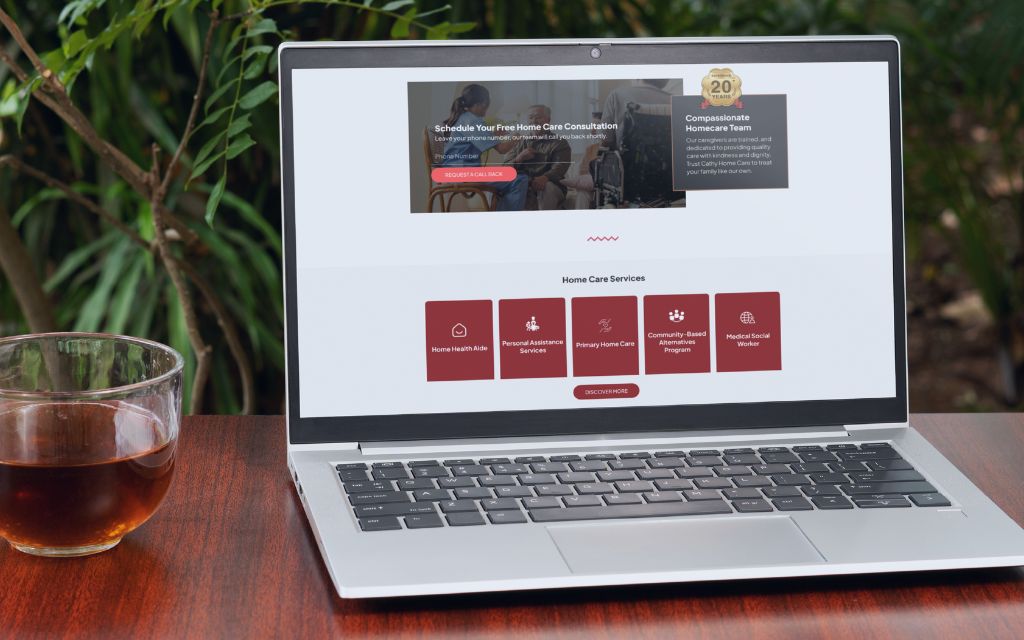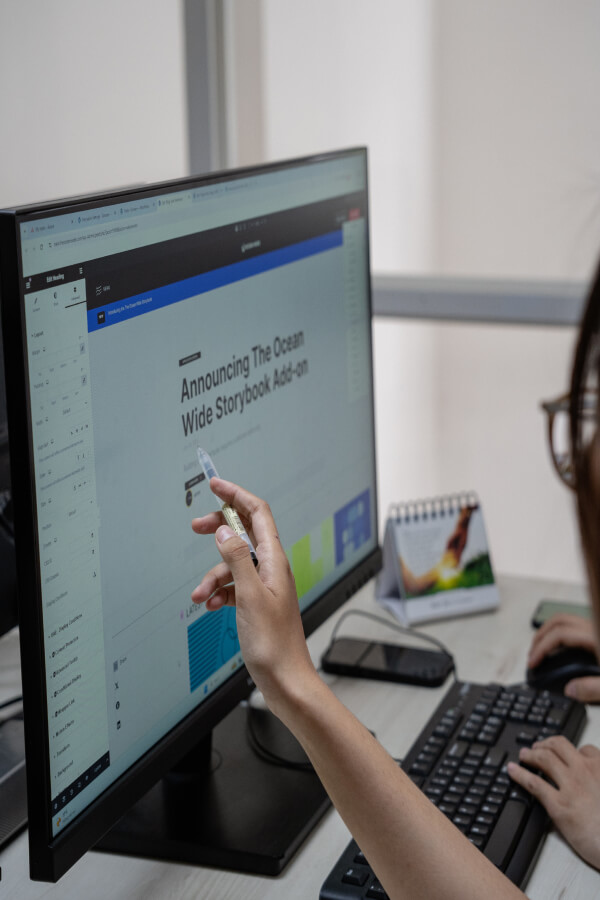Website accessibility stands as a critical factor for Denver businesses navigating today’s digital landscape. With over 8,800 ADA lawsuits filed against websites in 2024 alone, Colorado businesses face mounting pressure to ensure their digital presence serves everyone effectively.
The disability market represents $13 trillion in annual spending power globally. One in four Americans lives with some form of disability, creating a massive audience that accessible websites can capture. Beyond legal compliance, accessible design enhances user experience for all visitors and drives measurable business growth.
Denver’s thriving business community cannot afford to overlook accessibility requirements. Colorado’s specific legislation, HB21-1110, adds another layer of compliance requirements for local businesses. Smart business owners recognize that accessibility investment protects against legal risks while opening new revenue streams.
Why website accessibility matters for Denver businesses is simple: it protects you from legal risks while opening doors to a wider customer base. As ADA lawsuits rise, accessibility has become a must-have, not just a nice-to-have.
Understanding ADA compliance requirements for Colorado businesses
The Americans with Disabilities Act extends beyond physical spaces to digital environments. Federal courts consistently rule that websites must provide equal access to users with disabilities. The Department of Justice supports WCAG 2.1 Level AA as the standard for digital accessibility compliance.
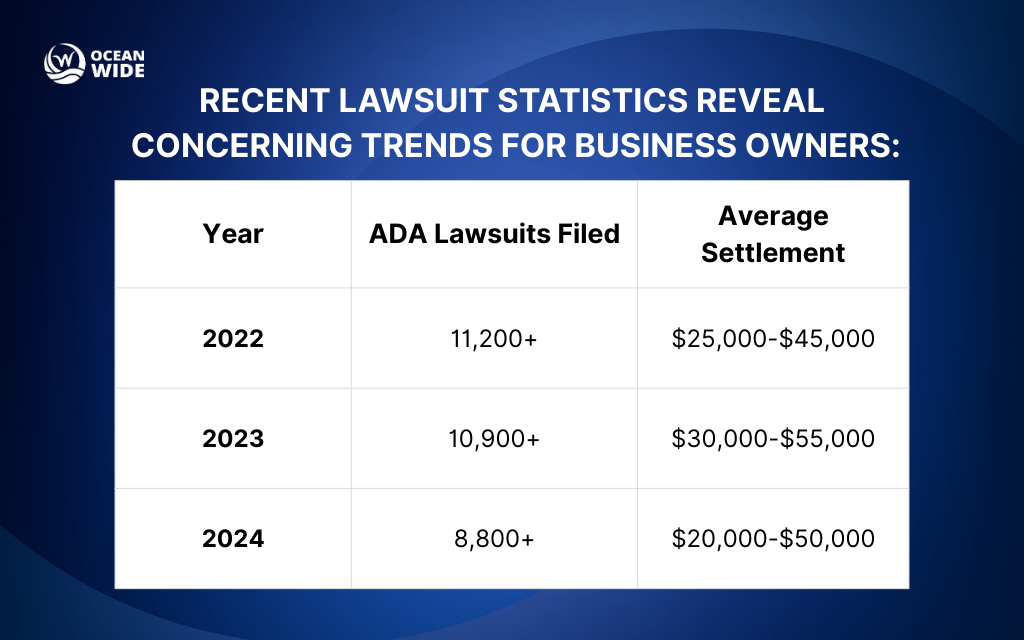
Colorado’s HB21-1110 legislation specifically addresses digital accessibility for state and local government websites. While this law primarily targets public sector entities, it signals Colorado’s commitment to digital inclusion and sets expectations for private businesses.
Recent lawsuit statistics reveal concerning trends for business owners:
| Year | ADA Lawsuits Filed | Average Settlement |
| 2022 | 11,200+ | $25,000-$45,000 |
| 2023 | 10,900+ | $30,000-$55,000 |
| 2024 | 8,800+ | $20,000-$50,000 |
Small businesses face particular vulnerability. Many lawsuits target companies with insufficient accessibility measures, regardless of company size or revenue. Legal costs alone can devastate small business budgets, making prevention far more cost-effective than remediation after litigation.
Protect your business from accessibility lawsuits. Contact The Ocean Wide at [email protected] for professional accessibility assessment and implementation.
Business benefits of accessible website design
Accessible websites deliver measurable returns on investment. Forrester Research demonstrates that every dollar invested in accessibility generates up to $100 in returns through increased revenue, reduced support costs, and improved customer satisfaction.
Market expansion opportunities through accessibility include:
Customer Base Growth The disability community controls significant purchasing power. Accessible websites capture this market segment while improving experiences for elderly users, mobile users, and those with temporary impairments.
Search Engine Optimization Benefits Google’s algorithms favor websites with accessible features. Proper heading structures, alt text for images, and semantic HTML markup improve search rankings. Screen reader compatibility often correlates with better mobile performance and faster loading speeds.
Brand Reputation Enhancement Inclusive design demonstrates corporate social responsibility. Companies with accessible websites build stronger customer loyalty and positive brand associations. Millennials and Gen Z consumers particularly value inclusive business practices.
Conversion Rate Improvements Microsoft research shows that inclusive design principles increase usability by 30% for all users. Clear navigation, proper color contrast, and logical page structures help everyone complete desired actions more effectively.
The PayPal case study illustrates accessibility’s business impact. After implementing comprehensive accessibility improvements, PayPal measured significant conversion rate increases across all user segments, not just those requiring assistive technologies.
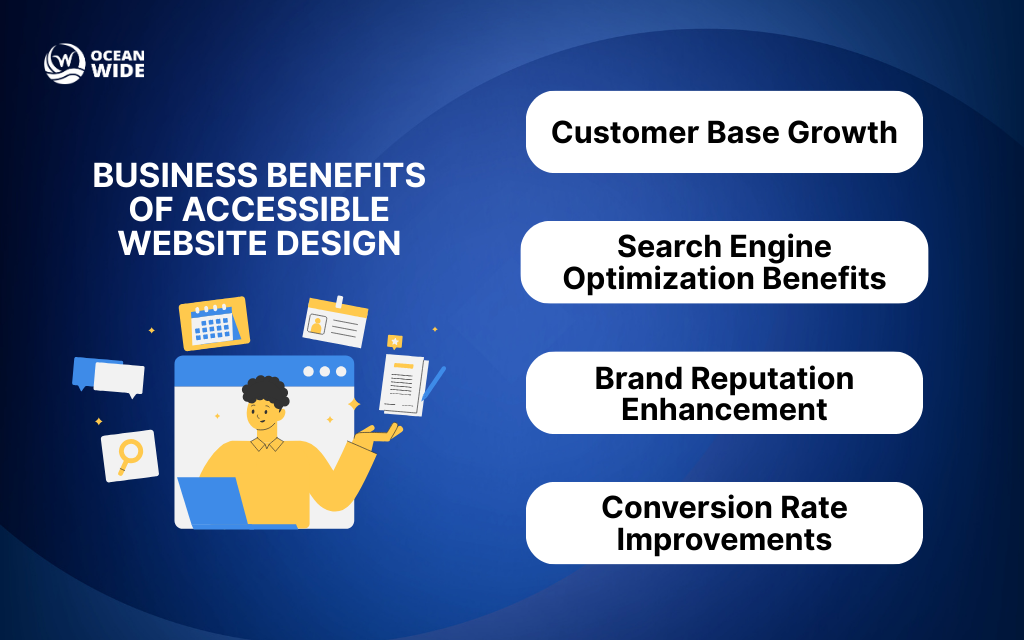
Want to unlock these business benefits? The Ocean Wide specializes in accessible design that drives growth. Schedule your consultation at (720) 334-0899.
Essential website accessibility standards and guidelines
Web Content Accessibility Guidelines (WCAG) 2.1 provides the framework for accessible web design. These international standards organize accessibility requirements into four core principles:
Perceivable Information must be presentable in ways users can perceive. This includes providing text alternatives for images, captions for videos, and sufficient color contrast ratios. Color contrast tools help ensure text remains readable against background colors.
Operable Interface components must be operable by all users. Keyboard navigation enables users who cannot use mice to access all website functions. Focus indicators help users track their location on the page.
Understandable Information and user interface operation must be understandable. Clear language, consistent navigation, and helpful error messages support users with cognitive disabilities and benefit all visitors.
Robust Content must be robust enough for various assistive technologies. Proper HTML markup ensures screen readers can interpret page content accurately. Semantic elements help assistive technologies understand page structure and purpose.
WCAG compliance levels include:
| Level | Requirements | Business Application |
| Level A | Basic accessibility | Minimum legal protection |
| Level AA | Standard accessibility | Industry standard recommendation |
| Level AAA | Enhanced accessibility | Specialized applications only |
Most Denver businesses should target WCAG 2.1 Level AA compliance. This level provides strong legal protection while remaining achievable for small business budgets.
Need help implementing WCAG standards? The Ocean Wide offers complete accessibility solutions. Email us at [email protected] for detailed guidance.
Practical implementation strategies for small businesses
Website accessibility implementation follows a structured approach that maximizes impact while managing costs effectively. Smart business owners prioritize high-impact improvements before tackling complex technical challenges.
- Phase 1: Quick Wins (Weeks 1-2) Start with improvements that require minimal technical expertise. Add alt text to images, ensure proper heading hierarchies, and verify keyboard navigation works throughout the site. These changes often resolve 40-60% of common accessibility barriers.
- Phase 2: Technical Improvements (Weeks 3-4) Address color contrast issues, improve form labels, and enhance focus indicators. Many content management systems include accessibility features that non-technical users can implement with basic training.
- Phase 3: Comprehensive Testing (Weeks 5-6) Conduct thorough testing with screen readers and other assistive technologies. Professional accessibility audits identify issues that automated tools miss and provide detailed remediation guidance.
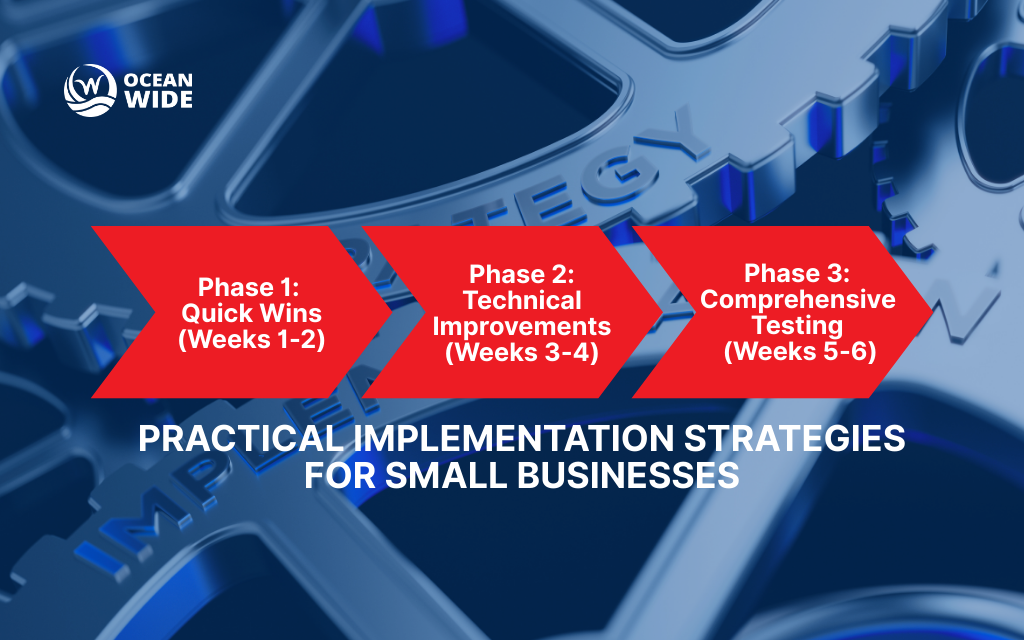
Testing tools help monitor accessibility compliance:
Free Testing Options WAVE Web Accessibility Evaluation Tool provides instant feedback on accessibility issues. Google Lighthouse includes accessibility audits in its performance reports. Color contrast analyzers verify text readability across different color combinations.
Professional Testing Services Expert accessibility audits deliver comprehensive assessments that automated tools cannot provide. Professional testers use actual assistive technologies to identify real-world barriers. Manual testing catches nuanced issues that affect user experience.
Ongoing Monitoring Programs Accessibility requires continuous attention as websites evolve. Regular testing schedules prevent accessibility regressions. Staff training ensures new content maintains accessibility standards.
Ready to implement accessibility improvements? The Ocean Wide guides Denver businesses through every step. Call (720) 334-0899 to start your accessibility journey.
Tools and resources for accessibility testing
Effective accessibility testing combines automated tools with manual evaluation techniques. Smart business owners leverage both approaches to ensure comprehensive coverage while managing time and budget constraints.
Automated Testing Solutions WAVE provides instant visual feedback on accessibility issues. The tool highlights problems directly on web pages, making issues easy to identify and understand. WAVE catches common problems like missing alt text, poor color contrast, and structural issues.
Google Lighthouse accessibility audit integrates into Chrome browser development tools. This free tool evaluates accessibility alongside performance and SEO metrics. Lighthouse provides specific recommendations for improving accessibility scores.
Axe DevTools offers advanced accessibility testing for developers and content creators. The browser extension identifies complex accessibility issues and provides detailed guidance for remediation.
Manual Testing Procedures Keyboard navigation testing ensures all website functions work without a mouse. Tab through every interactive element to verify logical navigation order. Ensure all form fields, buttons, and links respond to keyboard input.
Screen reader testing reveals how assistive technology users experience your website. NVDA provides free screen reader software for Windows users. VoiceOver comes built into Mac computers and iOS devices.
Color contrast evaluation ensures text remains readable for users with visual impairments. WebAIM’s contrast checker verifies compliance with WCAG standards. Test all text combinations including buttons, links, and form elements.
Professional Services vs DIY Approach Small businesses often benefit from professional accessibility audits before attempting self-implementation. Expert evaluation identifies priority issues and provides implementation roadmaps. Professional guidance prevents costly mistakes and ensures comprehensive coverage.
DIY testing works well for ongoing monitoring after initial professional assessment. Regular automated testing catches new issues as content changes. Staff training enables internal teams to maintain accessibility standards.
Need professional accessibility testing? The Ocean Wide provides comprehensive audits and ongoing monitoring. Contact us at [email protected] for expert evaluation.
Why Denver businesses choose The Ocean Wide for accessibility solutions
Local expertise makes a significant difference in accessibility implementation success. Denver businesses benefit from working with professionals who understand Colorado’s specific legal landscape and business environment.
- Colorado Market Knowledge The Ocean Wide understands HB21-1110 requirements and their implications for private businesses. Our team stays current with Colorado accessibility legislation and enforcement trends. Local knowledge helps Denver businesses prepare for evolving compliance requirements.
- Comprehensive Service Approach Our accessibility solutions integrate seamlessly with existing web development workflows. We provide end-to-end services from initial audits through ongoing compliance monitoring. Clients receive detailed remediation plans with clear implementation timelines.
- Proven Results for Local Businesses Denver clients consistently achieve WCAG 2.1 Level AA compliance within projected timelines. Our systematic approach minimizes business disruption while maximizing accessibility improvements. Measurable results include improved search rankings, increased conversion rates, and enhanced user satisfaction.
- Same-Timezone Support Colorado businesses receive responsive support during local business hours. Quick turnaround times help address urgent accessibility issues promptly. Direct communication with local professionals streamlines project coordination.
- Long-Term Partnership Focus Accessibility requires ongoing attention as websites evolve and regulations change. The Ocean Wide provides continuous monitoring services that keep Denver businesses compliant over time. Regular check-ins ensure accessibility standards maintain effectiveness.
Success stories from Denver clients demonstrate real-world accessibility impact. Local startups report increased user engagement after implementing accessibility improvements. Established businesses document measurable conversion rate increases following comprehensive accessibility audits.
Ready to partner with Denver’s accessibility experts? The Ocean Wide delivers results for Colorado businesses. Call (720) 334-0899 for your free accessibility consultation.
FAQs about Why is website accessibility important for Denver businesses?
How much does accessibility remediation cost for small businesses?
Accessibility implementation costs vary based on website complexity and current accessibility status. Basic improvements typically range from $2,000-$8,000. Professional audits help prioritize improvements for maximum impact. Contact The Ocean Wide at (720) 334-0899 for detailed cost estimates.
Can accessibility plugins provide adequate ADA compliance?
Accessibility overlays alone cannot ensure comprehensive compliance. In 2024, 22.65% of ADA lawsuits targeted websites using accessibility widgets. Professional implementation provides more reliable protection than automated solutions.
How long does accessibility implementation take?
Most small business websites achieve WCAG 2.1 Level AA compliance within 4-8 weeks with professional guidance. Timeline depends on website complexity and required improvements. The Ocean Wide provides realistic timelines during initial consultations.
Does accessibility really improve SEO and conversions?
Research consistently demonstrates accessibility’s positive impact on search rankings and user experience. Accessible websites often perform better in search results due to improved technical structure. Microsoft research shows 30% usability improvements for all users through inclusive design.
What ongoing maintenance does accessibility require?
Accessibility requires continuous monitoring as websites change and regulations evolve. Regular testing schedules prevent accessibility regressions. The Ocean Wide offers ongoing monitoring programs that maintain compliance over time.
What level of WCAG compliance do Denver businesses need?
WCAG 2.1 Level AA provides the industry standard for ADA compliance. This level offers strong legal protection while remaining achievable for small business budgets. The Ocean Wide helps Denver businesses achieve Level AA compliance efficiently.
Take action now to protect and grow your Denver business
Website accessibility represents both legal necessity and business opportunity for Denver companies. The combination of federal ADA requirements, Colorado state legislation, and significant market opportunities makes accessibility implementation essential for sustainable business growth.
Smart business owners recognize that accessibility investment pays dividends through legal protection, market expansion, and improved user experience. The disability community’s $13 trillion spending power remains largely untapped by businesses with inaccessible websites.
Don’t wait for accessibility lawsuits to force action. The Ocean Wide provides comprehensive accessibility solutions built specifically for Denver businesses.
Ready to make your website accessible and profitable? Let’s navigate the digital ocean together and ensure your Denver business thrives with inclusive design that serves everyone effectively.
